Posts Tagged ‘Chicagoland’
HERE TO WELCOME SERIES Part 1 – Asylum Seekers and the Crisis at the Border.
On May 11th, World Relief Chicagoland started a two-part series, “Here to Welcome”! Watch the replay above to hear an update about the migration crisis at the U.S./Mexico border from World Relief’s Matthew Soerens. You’ll also learn how you and your church can connect with asylum seekers, refugees, and other immigrants right here in Chicagoland in the panel discussion that follows. Join us for part two of the series on May 18 at noon to learn about the rebuild of the U.S. refugee resettlement program. Register for this free virtual event here!
Mother’s Day
This Mother’s Day, we want to wish all of our mothers, in all stages of life, a Happy Mother’s Day. We know that motherhood is a blessing, but it’s not without its trials. For many of our families, mothers have made immense sacrifices for their children. Today, we honor and thank you for all that you do.
Seeta is a mother of four. When her family left Afghanistan, however, only three children boarded the plane with her and her husband, Noor.
Aysha, their youngest daughter at less than a year old, was forced to stay behind as her family left in search of safety in America. Having served the U.S. military as a journalist, the Habibs could no longer stay in Afghanistan for fear of retaliation from the Taliban.
“I was working with the U.S. military as a journalist, and she was working with USAID (United State Agency for International Development) and United Nations, so it was very dangerous for us because the Taliban did not accept people who worked for foreigners,” Noor explained. “We were not safe in our country, so in order to seek safety we came here.”
Consequently, Noor and his family were offered Special Immigrant Visas (SIVs) from the U.S. government as a way to not only thank them but also to protect them.
But at the time the visa paperwork was issued, Aysha had not been born. As a result, her paperwork was filed separately, and Noor and Seeta were forced to leave her behind with other family members.
“It was a hard time because we didn’t have any choice,” said Noor, who recently found work with Amazon. “We thought if we lost that chance, we wouldn’t find it again. Because of that, we left our baby there. We came here. If we had cancelled our visas, maybe we wouldn’t have been able to get [them] back.”
Instead, Seeta and her husband arrived in Memphis in October 2020 with their eight-, six- and five-year-old children. It wasn’t until two months later that they received news about Aysha’s visa, but, for her to come, Seeta risked not being able to return to the U.S. because her green card had not arrived.
Determined to be reunited with her daughter, Seeta and her Good Neighbor Team began looking for a way to make it possible alongside World Relief Memphis staff. After speaking with the State Department, they discovered that her green card had been misplaced, but that she could go to Afghanistan with her current visa knowing that it was coming.
Yet when she arrived in Afghanistan, she was greeted by a baby who didn’t recognize her. The months apart had created distance, but Seeta was patient.
“It was emotional, and she didn’t want to come with me for one day or night, like maybe she [had] forgotten me,” Seeta said. “Then she realized who I am, and now she’s not leaving me for one minute.”
Finally, Seeta brought her daughter home. Her family was together, and they could begin to rebuild their lives in safety.
Today, she works for Shelby County, helping connect others in her community with the resources they need in the wake of the pandemic. After advocating for women and children’s safety in Afghanistan for many years, Seeta seeks to empower women in the workplace.
Similarly, Aysha is flourishing.
“She’s very happy with us now. When she came, she was sad and keeping calm,” Noor said. “But now, she’s come back better than ever and is very active.”
When asked if they had hopes and dreams for the future, Noor and Seeta immediately responded.
“For sure, that’s why we are here. We are here because of these. We try to do all our best for all our children.”
*This story was originally shared by our World Relief Memphis office.
I was Only Thinking of My Kids
Four years ago, Maryam and her kids were in a much different situation than today. The family left their home in Dahok, Iraq the year ISIS took over Mosul (50 miles to the south) and killed thousands of Yazidi people in Sinjar (a hundred miles to the west). Maryam didn’t share the details of their departure or why her husband did not flee with them. But it was clearly a dangerous region for Assyrian Christians like them, or any other religious minorities…
Maryam—who preferred not to be photographed—had three-year-old Jseeka (pictured above), two-year-old Danyal, and was five months pregnant when they left for Turkey. Here’s what she had to say about that time:
“Here in America, we have a lot of things we want to do. We are going a step at a time. For example, we want to study, buy a car, learn how to drive, work. But in Turkey, there was nothing. We were just in transit. My kids didn’t go to school. We were just waiting for the paperwork to come to America. Just sitting at home waiting for the processing. I was counting the time hour by hour.”
“I was always thinking about what I was going to do, how to survive, what to do with these kids. I was nervous and kind of depressed. But I was only thinking of my kids, and they gave me power to keep going. I was thinking, ‘I am here only for them. I have to be a strong woman for my kids.’”
After two years and four months in Turkey, the family came to the United States through the refugee resettlement program. They joined Maryam’s parents, two sisters, and other relatives. Now they live a block from their neighborhood school. The extended family helps care for the kids. And twice a week Jseeka and Danyal attend a World Relief after school program hosted by a local church.
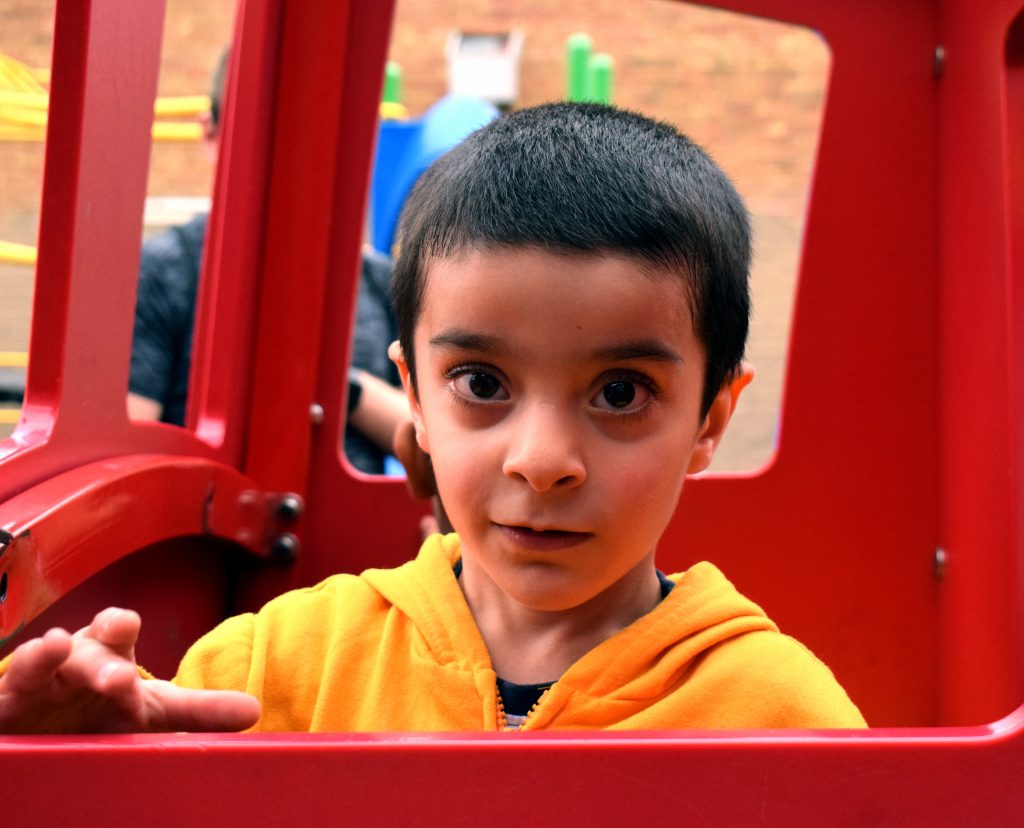
When you help refugees rebuild their lives, you give more than materials and services for kids like Jseeka and Danyal. You provide something immaterial: the sense of stability and growth that was lost in displacement. You walk with families as they move from displacement to belonging, retaining parts of their culture and adopting parts of American culture.
“I want my kids to keep learning English and to learn how to be on time, like Americans,” said Maryam. “You guys are very organized here. When you say four o’clock, it’s four o’clock. Not six or seven. At 8:30, they close the door to my kids’ school. If you get there at 8:31, you’re late and you have to take your kids in through the office and explain why.”
Maryam laughed as she said these words, her smile alone expressing a range of emotions that couldn’t be articulated in a short conversation across a language and culture gap. But among them, a few were clear: strength, pride on behalf of her kids, and hope for a future together with her loved ones.
As a community of World Relief donors, you have helped 400,000 refugees and immigrants like Maryam, Jseeka, and Danyal rebuild their lives. Continue your support this month.
A 3-Minute Peek Into The 2021 Global Gala
To access the full-length Global Gala video will all the stories, please email chicagoland@wr.org to request access.
To make a donation to help immigrants and refugees
rebuild their lives click the donate button at the top of the screen.
Thank you!
Reyna’s Story
Your gift gives back
“At the beginning of this pandemic, everything we were doing as an EMT became 10 times harder.” Twenty-six-year-old Reyna has been working as an EMT and front-line worker throughout the Covid-19 crisis. It is hard to imagine her small frame lifting grown men from a third-floor apartment down the stairs to the ambulance below, but as she tells stories of her job she beams with pride because she knows she is making a difference. She is passionate about serving her city.
And you gave her the support to help our city.
Originally from Mexico, she came to the United States when she was four years old. Her father brought her family across the border because he was having difficulties finding work to care for his family as a mechanic. They settled in Chicago and she has grown up here with her close-knit family.
She recalls not sharing her family’s situation with many because of fear. But when she connected with World Relief’s Immigration Legal Services team, opportunities were opened. She started the DACA application process right after high school and was approved in a matter of months. Reyna shares, “I could do so many new things. I was able to have job opportunities. I never really thought I would go to college and I do not think my family ever expected I would be able to go to college because I was undocumented. We never knew what we could and could not do.”
After receiving a scholarship for being in the top 10% of her high school class, Reyna began college studying Computer Science. After a year of studying, she realized what she really wanted to do was be a part of the medical community, so she became an EMT. Her goal now is to continue her studies to become a nurse and hopes to work in an emergency room.
You provided new possibilities. Reyna is providing her patients the very best.
She has gone above and beyond in her job even carrying a fanny pack with extra supplies like masks for people that do not have them because for her “being there for my patients is my job.”
Reyna is a vibrant and brave young woman who like many essential workers is risking her safety to serve others during this crisis in our nation.
“When people ask me if I am Hispanic or Mexican or American, I say that I feel Mexican-American. I am both and Chicago is home, and it is where I belong. I fell in love with this city. And I want to help Chicagoans.”
She beams with gratefulness because your support has opened more opportunities in her life, “I so appreciate World Relief’s advice – it is one of those places you can definitely trust.”
Get to Know Our Staff: Haiti
In 2021, we’re giving you the inside scoop on the work World Relief is doing in communities around the world through a new series called, Get to Know Our Staff.
Today, we’re excited to introduce you to Esther Pyram, World Relief Haiti’s Integral Mission and Church Empowerment Zone Manager. Esther is a writer, a wife, a sister and a friend. Her prayerful spirit and joyful work ethic are contagious, and today she’s sharing more about her role at World Relief and the transformation she’s personally experienced while leading alongside others in Haiti.
What is your name?
My name is Esther Phtama Pyram Louissaint, a Christian believer. I am a wife, a sister, a friend and a beloved daughter.
What is your role at World Relief?
I have been with World Relief since February 2016. I joined as a field coordinator. Currently, I work as the Integral Mission and Church Empowerment Zone Manager.
What is your favorite thing about your job?
There is nothing more exciting than doing what you know you were called to do. It is a complete joy to serve, to participate in this holistic transformation we are looking for in our community. Therefore, in the past five years, I have always considered myself a servitor rather than an employee.
Can you share some stories that excite you?
I had the privilege of witnessing churches’ growth and seeing them proudly standing up for the most vulnerable. I saw children going to school for the first time in communities where there was no school before and where State Institutions are absent. I have observed church leaders contributing generously and with inexplicable joy to organize community weddings regardless of religious or denominational backgrounds. I saw widows’ homes restored, gardens planted, and crops at their feet to face the new season. I have seen life blooming, and hope being restored for many brothers and sisters.
Yet, the most wonderful part of it all is to witness my own transformation through this process. I have become stronger, more confident, empowered and impacted. I am working with more tact, joy, love and a constant quest for excellence in all areas of my life.
How have you grown in this role?
My relationships with God, with myself, with my family and others have been transformed beyond belief. Areas of my life which I struggled with in the past have been restored, including my finances, my ministries and my dreams.
My increased mental strength allows me to face nasty critics with steadiness and an unwavering attitude. Such critics can no longer put me down. In short, I know who I am: a loved, gifted and blessed girl, and all the assets in the world cannot compensate for such newly built confidence in myself and in Our Loving Father.
What are your hopes for the communities where you live and work?
Like World Relief, I want to see local churches empowered to serve the most vulnerable. I diligently pray, and I long to see women in our communities, and especially those in our local churches, rise to their talents, gifts and abilities so they may answer their divine call and enter their destiny.
I want to see our youth plan their future with more hope, certainty and dignity. I want to see my community rise and move forward on the road to progress, success and development. I want to see families becoming stronger by the days and despite the challenges. I long to see respectable citizens taking the lead in their communities in this new generation. In short, I want to continue witnessing blooming life and daily revival of hope for all.
What do you like to do when you’re not working?
I work with a wonderful, competent, and dynamic team under the supervision of Athanase Ndayisaba (World Relief Haiti Country Director). In my spare time I read, sing, pray and write beautiful novels that one day may be published. I inspire others to stay motivated and confident.
It was a pleasure to share a little of me with you.
Do you want to create holistic transformation in communities around the globe? World Relief is growing our team to meet the increased needs of our world, and we’re looking for people like you to join us.

Rachel Clair serves as a Content Writer at World Relief. With a background in creative writing and children’s ministry, she is passionate about helping people of all ages think creatively and love God with their hearts, souls and minds.
What Can I do Now?
Empathy and Skill
“I’ve never been a refugee,” says Jenny Park, “but I feel like we all have moments where you feel like you don’t belong anywhere. For me, it was feeling emotionally displaced sometimes while growing up as an immigrant.”
Jenny joined World Relief as a volunteer tutor in the summer of 2020. Having immigrated to central Indiana from Korea with her family as a Kindergartener, she felt well-equipped to empathize and support other young immigrants, including refugees and asylum-seekers.
“My heart and the experiences I’ve had make me feel especially for young refugees,” she says. “They soak in and pick up the language much faster. They come over and have to be a leader of the family. As an immigrant I went through some of that as well.”
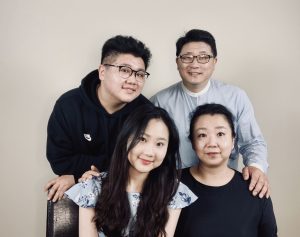
In order to help her family with finances, Jenny began tutoring other Korean immigrants while in high school, working with up to 12 students at one point. Developing this skill prepared her for her work as a volunteer.
“I always knew I wanted to do something to help people,” she says. “When I was little, I was like, ‘OK, I’ll do something to help when I become a doctor.’ But when I started volunteering with World Relief, I asked myself, ‘Well, what can I do now?’ Since I’ve been tutoring so many years already, it was like I kind of had this program inside of me – like how to deal with students and lead the class. That’s how I decided to start tutoring with World Relief.”
Getting Connected
Jenny received training and support from World Relief staff, who connected her with Medina, a young woman from East Africa who speaks four languages and dreams to be an English teacher. Facing barriers related to e-learning during COVID-19, Medina was able to meet consistently with Jenny for extra English practice and homework support through the school year. (Read Medina’s story here.)
“It was rewarding that I was able to make this relationship with Medina,” says Jenny. “It would have been almost impossible for us to meet if it wasn’t for this virtual world we’re all living in due to COVID…When you become a helper, it’s really easy to feel like it’s a weird, hierarchical position. But I feel like we’ve created a beautiful friendship...”
As a volunteer in World Relief’s Youth Program, you’ll be equipped to put your skills and life experience to use. You’ll have the opportunity to walk alongside young people like Medina as they lay a foundation for life in the United States. Most importantly, you’ll be invited to become not just a helper, but a friend.
Writing and interview by Jacob Mau
Medina
Every day World Relief staff and volunteers are invited into stories. We are challenged to recognize the nuanced image of God in each person we serve, and remember that their stories stretch far beyond the boundaries of words like “immigrant, refugee, asylum-seeker.” The posts in this section—voiced in first-person, too long for social media, and lightly edited—extend that invitation to you.
In this post we meet Medina. She’s 17, has learned four languages, and her dream is to be an English teacher. Her family is from the Afar people group of East Africa, and they were forcibly displaced from Eritrea to Ethiopia when Medina was a little girl. When she arrived in the U.S. in 2018, it was the second time she started learning a new country and new language.
Middle Child
Medina — In our country, they start from your own name, then your father, then your grandfather. For example, Fatuma Ali Hassan. But in America they just say Fatuma Hassan. My mom has a nickname. She was her father’s favorite child. So he used to call her Luli. The meaning of Luli – I don’t know how to say it in English – it’s something like a diamond, or gold. A lot of people used to call me Medi, but my nickname doesn’t have a meaning.
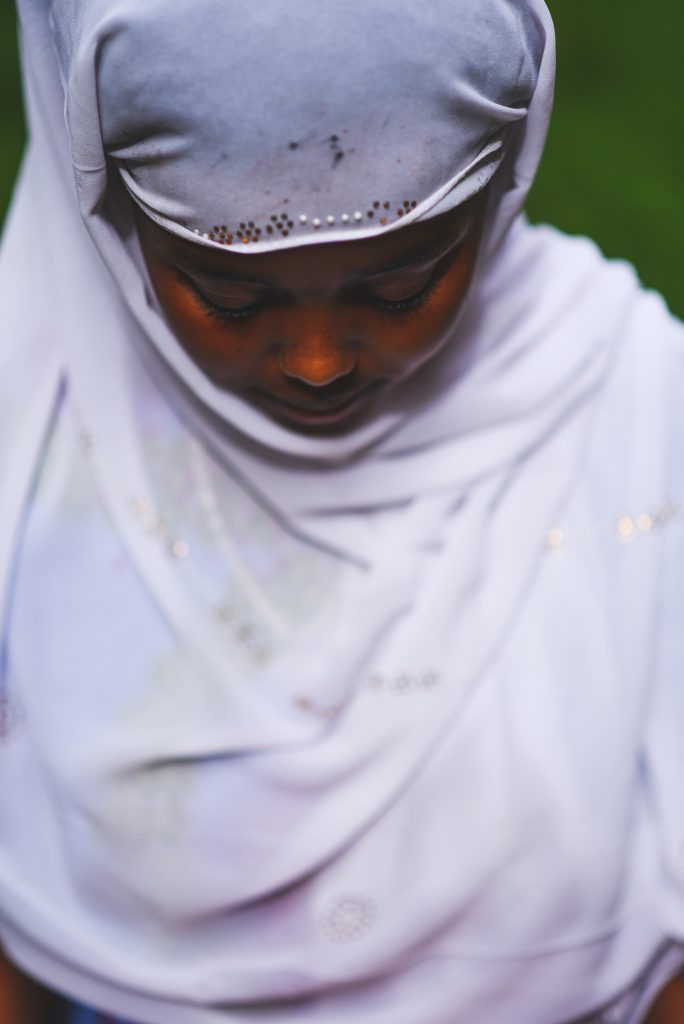
Before my little sister was born, my brothers used to listen to me and do whatever I wanted for me because I was the youngest one in our house. But after she was born, they did whatever she wanted for her. Now I’m in the middle so they don’t listen to me that much. Most of the time the middle one has to do everything. They say, “go and clean the room.” And if you say no, they pay you. They say, “I’m gonna give you ten bucks.”
America: “It’s good. It’s cold.”
When we came the U.S., it was me and my mom and my sister and my brother. My other brother and his family came before us. I think they came like one week before. We didn’t know we’d come that fast after my brother. But we were really happy when they said, “it’s time for you.” We had no idea what life in the U.S. would be like. We had some friends who moved here already, and they were telling us a little bit about America. They said, “It’s good. It’s cold.”
We were excited to see America – what it looks like and everything. For some people coming to the US takes like two years or three years. My other two brothers in Ethiopia are also waiting for their chance. One of them has a wife and one child.

When I went from Eretria to Ethiopia, it was a different life. And now it’s a different life in the USA. When I went to Ethiopia, I was seven or something. I don’t remember exactly. In Eritrea I used to speak Tigrinya, because that’s the language most of the people speak there. And when I came to Ethiopia, I completely forgot Tigrinya and I learned Amharic. Now in the U.S.A. I’m kind of forgetting some Amharic, and I’m learning English. In Amharic, when you write, it’s hard. Tigrinya uses the same letters as Amharic, I think. But in English, the letters are the same as the letters in Afar. My family speaks Afar, and I will never forget that language because we always speak it in the house and everywhere.
As a community of World Relief donors and volunteers, you have supported Medina and her family as they continue adapting in their journey from displacement to belonging. Through employment support, for example, you helped her brother increase his earning power by $10 per hour since his first job in the U.S.
Pizza & New Friends
I’m not gonna lie. School was very different over there in Ethiopia. I used to go sometimes and not go sometimes. It was half a day. We used to go in the morning and get out at lunch time. We all spoke the same language there, and we could say anything we wanted to each other. But here, sometimes if you want to say something to your friends, but you don‘t know how it is in English, it’s a little bit harder to explain.
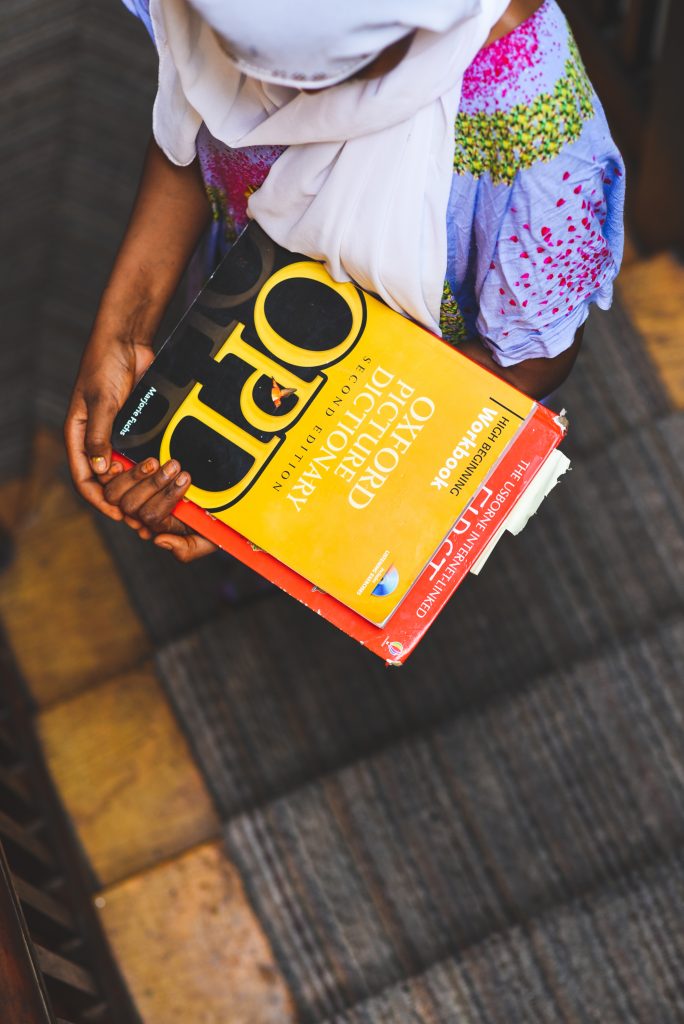
I started in 9th grade in the U.S. in 2018. The first day of school was pretty hard. We didn’t know anyone. We didn’t know anything about English – just how to say “hello.” That was it. We didn’t eat the lunch. We didn’t like the food, or the milk. The first two days I brought my own food from home. But after a few days passed, I saw the pizza and I fell in love with it. There were some Muslim friends, and they told me the pizza was Halal. So it was okay to eat it. It’s really good.
After a while, we found friends. There were some girls who all came from Africa, but our language was not the same. They didn’t know English, and I didn’t know English. I think they’re from Tanzania. My English teacher helped a lot. She was so nice. She was understanding us, even though we didn’t speak English. Like when we explained to her with our hands if we needed water or something, she was understanding. My favorite subject is English. I’m bad at math. And I’m not that good at English actually, but when I try, it gets better.
You’ve been with Medina’s whole family through key moments like the first day of school in a new country. When COVID-19 hit, they had a team of volunteers who provided social connection, helped navigate shelter-in-place protocols, and offered emergency rental support when family members were laid off.
Dream Jobs
My tutor Jenny’s also really nice. I’ve only met her online. She lives in Indiana. She helps me with everything. We tell about ourselves. She tells me her story and I tell her my story. She told me about her family, and how she’s going to university. She’s from Korea, and lives with her mother and father and brother, and has some family in Korea. When I don‘t have homework we do extra stuff – reading and writing practice.
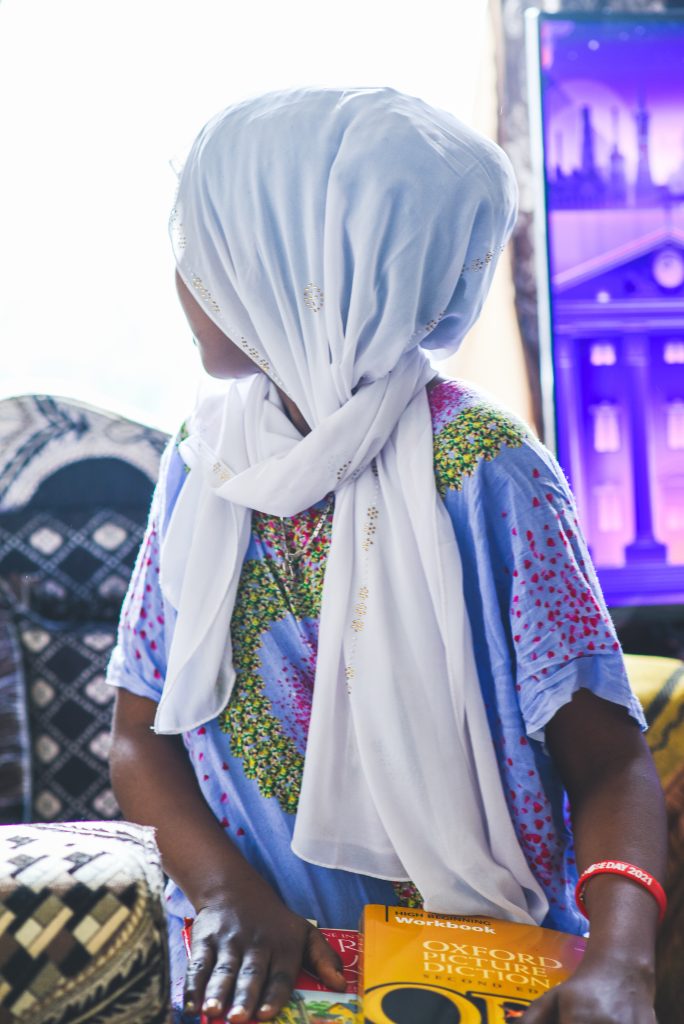
Jenny’s dream job is to be a doctor, and my dream job is to be an English teacher. English is not easy, but if you try and never give up it gets better and better. Other subjects are a little bit harder for me than English. So that’s why I feel like I want to be an English teacher. I think I‘ll teach kids, like 1st grade or second grade. (Read about Jenny’s path from interested to engaged here).
When I came to the US, I didn’t know how to speak English. A lot of people say I learn fast. That’s something I’m proud of. Another good thing is back in Ethiopia, to go somewhere for fun, it was a little bit far from my city. But here you can go downtown, to the zoo, to the beach. In the summer, Mr. Daniel from World Relief used to take us places. It was so fun, I’ll never forget. My favorite was the zoo. When we saw the animals and stuff like that. I hope the summer program can be in person this year.
Tik Tok & Covid
Learning on the computer is really hard. I go to Mather High School, and we are still not going in-person. The hardest part is sometimes the internet cuts off. Sometimes the computer is not working. Sometimes you just want to sleep. The teachers post the homework on google classroom and we send it back. It goes from 8am to 3:15pm. You get tired of sitting all day.
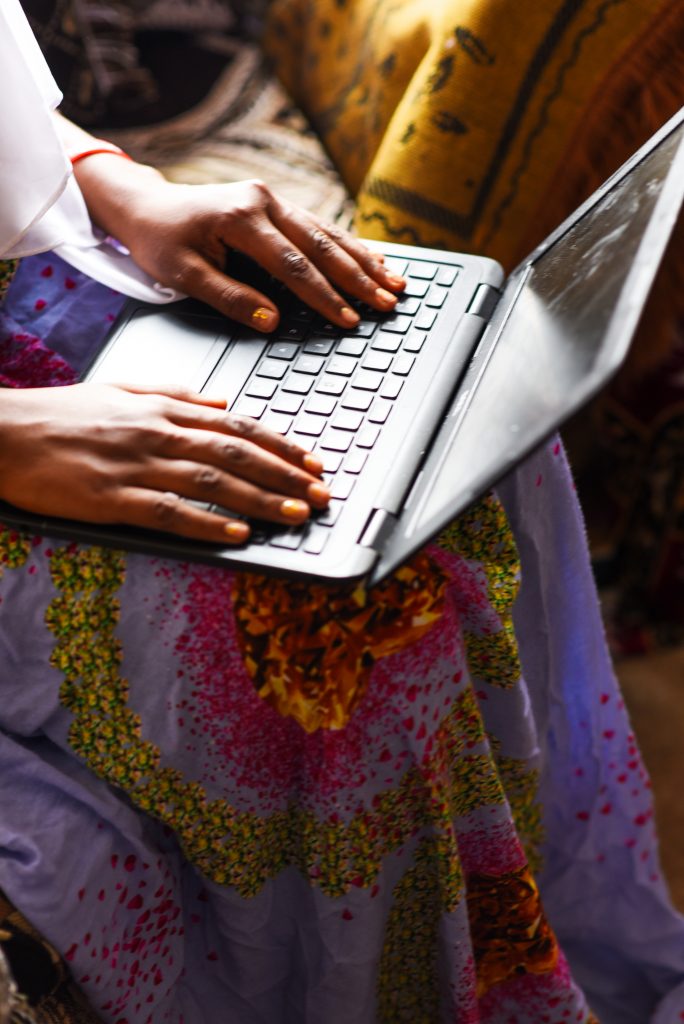
I feel like it’s way better to be in person. When everything is open. You can go everywhere without a mask. You can hang out and eat at restaurants. But now some people feel scared. Right now in our free time we just watch Youtube and movies. My little sister is on Tik Tok all day, doing a new dance, then a new dance. She makes her own videos, but I just watch. One time she made like 100 videos in a day. Tik Tok is crazy. If you watch Tik Tok, you forget about the other things.
Together, we’ve helped over 400,000 people like Medina and her family rebuild their lives in the United States. Continue your support today.
Photos by Rachel Wassink | Writing and interview by Jacob Mau
Spotlight on International Women’s Day
Honor International Women’s Day by watching this powerful event featuring immigrant women from all over the world!
Make a donation today to help other women thrive.









